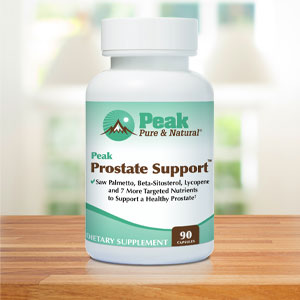Get Easy Health Digest™ in your inbox and don’t miss a thing when you subscribe today. Plus, get the free bonus report, Mother Nature’s Tips, Tricks and Remedies for Cholesterol, Blood Pressure & Blood Sugar as my way of saying welcome to the community!
10 testosterone-boosting tips every guy should know

If you want to boost your testosterone levels without resorting to medications, testosterone replacement therapy, or other conventional approaches, then you’ve come to the right place.
Every one of the 10 natural testosterone treatments discussed here have been shown scientifically to work. The secret is to put all of these tips into play if you really want results.
That may not be as hard as it sounds, because you may be following some of these tips already. If you’re not, then it’s time to kick these 10 natural testosterone treatments that work into gear.
- Adopt fast, quick cardio. Studies show that the best exercise to raise testosterone levels is fast, brief cardiovascular activities, and especially HIIT (high-intensity interval training). HIIT requires a mere 20 minutes per day and works roughly like this: (1) choose an aerobic activity, such as running, jumping rope, or cycling; (2) work full-out for 30 seconds; (3) work at a moderate pace for 90 seconds; (4) repeat #2 and #3 seven more times; (5) you are done.
In a group of young athletes who engaged in HIIT, researchers observed that testosterone levels rose immediately as well as 30 minutes after exercise. Another study noted that adding resistance exercise to HIIT increased both testosterone and cortisol.
- Banish your belly fat. Abdominal fat is where the male hormones testosterone and androstenedione are transformed into estradiol. The more belly fat you have, the more your T levels will decline. Once you banish your belly fat, your testosterone levels can begin to rise again.
In one study, obese men who lost weight while on a calorie-restricted diet showed an increase in T levels. Another study noted that obese men who lost 17 pounds experienced a 15 percent rise in their T levels.
- Take selected supplements. You may be familiar with commercials and ads for supplements that claim to raise testosterone levels. Unfortunately, many of those promises are not true. However, there are certain natural supplements that have been shown to help boost T levels, including beta-sitosterol, branched-chain amino acids, fenugreek, green tea extract, magnesium, and vitamin D, and zinc.
For example, a new Australian study explored the impact of a fenugreek extract supplement on 120 healthy men aged 43 to 70. After taking the supplement for 12 weeks (600 mg daily), there was a significant rise in both free and total testosterone levels, as well as sexual function, when compared with placebo.
- Tame stress. Chronic, unmanaged stress is accompanied by high levels of cortisol, a stress hormone that depletes the body of DHEA (dehydroepiandrosterone). DHEA is necessary for producing testosterone, so the formula is high cortisol = low DHEA = low T.
In a study of men age 30 to 55, investigators evaluated the impact of psychological stress on serum levels of testosterone. They found that men who had high psychological stress had significantly lower T levels when compared with their low-stress peers.
You can tame your stress as well as high cortisol if you engage in stress reducing activities on a regular basis. Try meditation, progressive relaxation, visualization, exercise, dance, yoga, or tai chi, for example.
- Zone in on Zzzzzs. If you want to replenish your testosterone levels, be sure to get seven to eight hours of sleep every night. Research has shown that insufficient sleep results in a drop in testosterone levels. A University of Chicago Medical Center study, for example, reported that young men who got a mere five hours of sleep per night saw a 10 to 15 percent decline in their T levels. A downward slide in testosterone levels is more likely to occur as you get older.
If you suffer with insomnia or are having difficulty getting enough sleep, evaluate your sleeping environment, lifestyle habits, and use of medications. Identify the factors that are preventing you from enjoying a full night’s sleep and make adjustments and habits.
- Eat clean foods. Your food and beverage choices have a significant impact on your overall health as well as your testosterone levels. This is especially true when choosing animal products, including meat, poultry, fish, and dairy, as they typically harbor contaminants such as steroids, hormones, dioxins, antibiotics, and pesticides. Therefore, if you do eat these foods, choose organically produced items only.
Sugar is another food that can effect T levels. A Massachusetts General Hospital study reported that eating sugar can cause a 25 percent drop in both total and free testosterone levels. Avoid processed foods and read labels carefully when making your purchases.
- Cash in on cruciferous veggies. You’ve probably heard it before, but here it is again: cruciferous vegetables are among the healthiest food choices you can make. If you didn’t know they can help enhance testosterone levels, then here’s how it’s done.
Broccoli, cabbage, bok choy, and other cruciferous veggies contain indole-3-carbinol, a precursor to diindolylmethane (DIM). The combination of these two phytonutrients works to control estradiol levels, a hormone that can cause a decline in testosterone levels. In essence, DIM helps raise levels of free testosterone. So eat your broccoli and Brussel sprouts often.
- Have sex often. Frequent participation in sexual activity can raise your testosterone levels. An investigative team evaluated the saliva samples of a group of men and found those who participated in sex recently showed a 72 percent increase in testosterone levels.
While partnered sexual activity is associated with a greater increase in testosterone, sexual activity in general can result in a rise in T levels. Always practice safe sex and keep the lines of communication open with your sexual partner so you can keep the home fires burning.
- X out xenoestrogens. Your daily surroundings are a haven for xenoestrogens, compounds that can disrupt your endocrine system; that is, your testosterone and other hormone levels. Among the most common xenoestrogens you can encounter are bisphenol-A (BPA) and phthalates, both of which are found in a wide range of plastics, personal health products, foods, building materials, and more.
The authors of a recent (April 2016) report explained that “phthalates are… linked with reduced levels of serum testosterone.” This study was followed by one from the Agency for Toxic Substances and Disease Registry in Atlanta, Georgia, which noted that exposure to BPA and another common xenoestrogen, benzophenone-3, has been shown to significantly lower total testosterone in young males.
- Humans are social animals, yet sometimes men tend to be lone wolves, retreating into a pattern of loneliness. Various research has noted an intimate relationship between loneliness and higher levels of the stress hormone cortisol. A Northwestern University study, for example, found that young adults who felt lonely during the day woke up with an increased cortisol response the next morning and that experiences of loneliness during the day were associated with rises in cortisol among those who also had high chronic stress.
Socializing often with family and close friends and sharing your innermost feelings, thoughts, and concerns can help reduce stress and thus cortisol levels. In turn, you can better maintain a healthy testosterone level when cortisol is reduced. Socializing also enhances levels of oxytocin, a hormone associated with empathy and feelings of comfort and belonging.
Editor’s note: Have you heard of EDTA chelation therapy? It was developed originally to remove lead and other contaminants, including heavy metals, from the body. Its uses now run the gamut from varicose veins to circulation. Click here to discover Chelation: Natural Miracle for Protecting Your Heart and Enhancing Your Health!
Sources:
-
Caronia LM et al. Abrupt decrease in serum testosterone levels after an oral glucose load in men: implications for screening for hypogonadism. Clinical Endocrinology (Oxford) 2013 Feb; 78(2): 291-96
-
Di Blasio A et al. Acute and delayed effects of high intensity interval resistance training organization on cortisol and testosterone production. Journal of Sports Medicine and Physical Fitness 2016 Mar; 56(3): 192-99
-
Doane LD, Adam EK. Loneliness and cortisol: momentary, day-to-day, and trait associations. Psychoneuroendocrinology 2010 Apr; 35(3): 430-41
-
Escasa MJ et al. Salivary testosterone levels in men at a US sex club. Archives of Sexual Behavior 2011; 40:921
-
Ft. Wayne Physical Medicine. The benefits of DIM.
-
Francis KT. The relationship between high and low trait psychological stress, serum testosterone, and serum cortisol. Experientia 1981 Dec 15; 37(12): 1296-97
-
Kilian Y et al. Markers of biological stress in response to a single session of high-intensity interval training and high-volume training in young athletes. European Journal of Applied Physiology 2016 Sep 10
-
Leproult R, van Cauter E. Effect of 1 week of sleep restriction on testosterone levels in young healthy men. JAMA 2011; 305(21): 2173
-
Lopez DS et al. Association of urinary phthalate metabolites with erectile dysfunction in racial and ethnic groups in the National Health and Nutrition Examination Survey 2001-2004. American Journal of Men’s Health 2016 Apr 1
-
Moran LJ et al. Long-term effects of a randomized controlled trial comparing high protein or high carbohydrate weight loss diets on testosterone, SHBG erectile and urinary function in overweight and obese men. PLoS One 2016 Sep 1; 11(9): e0161297
-
Rao A et al. Testofen, a specialized Trigonella foenum-graecum seed extract reduces age-related symptoms of androgen decrease, increases testosterone levels and improves sexual function in healthy aging males in a double-blind randomized clinical study. Aging Male 2016 Jun; 19(2): 134-42
-
Scinicariello F, Buser MC. Serum testosterone concentration and urinary bisphenol A, benzophenone-3, triclosan and paraben levels in male and female children and adolescents: NHANES 2011-2012. Environmental Health Perspectives 2016 Jul 6













